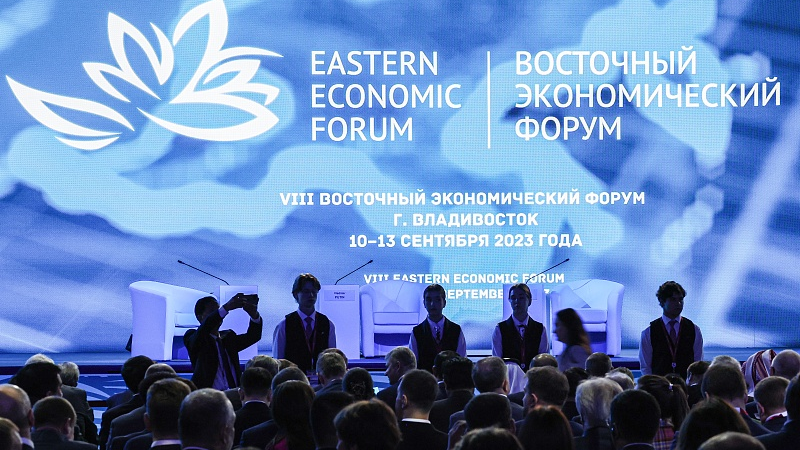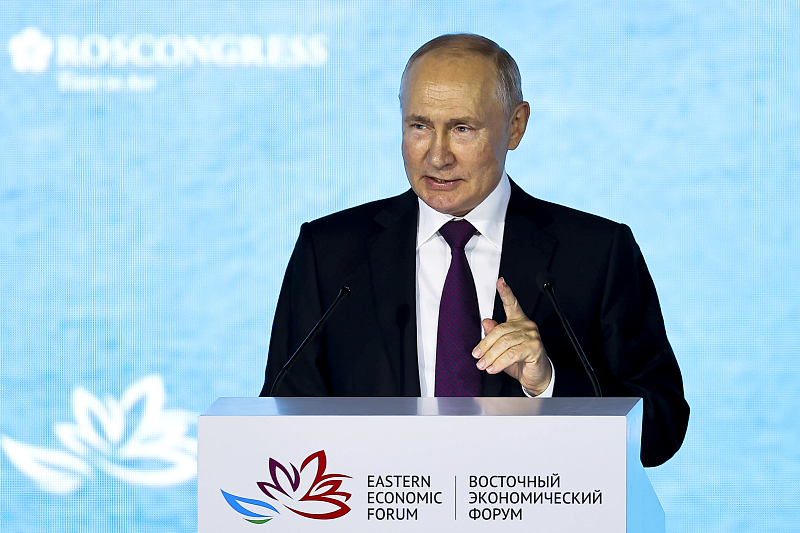
articipants gather for the plenary session of the 2023 Eastern Economic Forum (EEF) at the Far Eastern Federal University, Vladivostok, Russia, September 12, 2023. /CFP
articipants gather for the plenary session of the 2023 Eastern Economic Forum (EEF) at the Far Eastern Federal University, Vladivostok, Russia, September 12, 2023. /CFP
Editor's note: Masuda Khatun, a special commentator for CGTN, is an international affairs analyst and freelance columnist. The article reflects the author's opinions and not necessarily the views of CGTN.
The Far Eastern Federal University in Vladivostok is hosting the 8th Eastern Economic Forum (EEF) from September 10-13. Chinese Vice Premier Zhang Guoqing, attended the 8th EEF at the Russian government's invitation.
Russian President Vladimir Putin addressed the EEF plenary on September 12. Before that, Putin met with Zhang. Since 2015, the annual meeting has promoted Russia's Far East's economic growth and Asia-Pacific collaboration.
A report says President Putin told Zhang that ties between the two countries had reached a "absolutely unprecedented historical level" in recent years. Putin commended the two counties' commerce, energy, security, and humanitarian cooperation. Zhang welcomed Putin and emphasized China's desire to enhance strategic collaboration with Russia.
Discussions have encompassed a variety of key themes that affect both countries' interests. This diplomatic engagement seeks to strengthen ties between the two neighboring states.
Putin and Zhang met amidst rising hostilities between Russia and the West. The West has also been engaged in an illegitimate "cold war" with China. China has been urging the U.S. and its partners to stop meddling in its sovereignty and security concerns and asked for respectful cooperation.
On September 11, Russian Deputy Prime Minister and Minister of Industry and Trade Denis Manturov met with Zhang on the sideline of the EFF. The parties reviewed automobile, aviation, shipbuilding, and metallurgical priorities and collaboration potential.
Russia and China have cooperated on these and other global concerns including climate change, nuclear non-proliferation, counter-terrorism, and regional conflicts.
The move reflects Russia-China economic growth. The sanction constraints caused Russia to shift from Western to Eastern markets. Alfa-Bank, Russia's biggest private Bank, will open their office in China. According to Chinese customs, Russia was the top European nation in exports to China, fourth in imports, and second in trade turnover by 2022.
Trade between China and Russia might substantially increase. The EEF may also help Russia develop its Far East in tandem with China's northeastern revival. External opening-up might help northeast China realign its industrial structure. Continued collaboration and improved commercial infrastructure between Chinese and Russian cities are likely to boost China-Russia commerce to $200 billion this year, ahead of the 2024 deadline.

Russian President Vladimir Putin addresses a plenary session of the Eastern Economic Forum in Vladivostok, Russia, September 12, 2023. /CFP
Russian President Vladimir Putin addresses a plenary session of the Eastern Economic Forum in Vladivostok, Russia, September 12, 2023. /CFP
Russia and China have strengthened business connections despite the COVID-19 pandemic. China was Russia's greatest trading partner for the 11th consecutive year in 2020 with $107.8 billion in bilateral commerce. The two countries also collaborated on the Power of Siberia gas pipeline and Yamal LNG project. Russia and China traded around $93.8 billion from January to May 2023, up 40.7 percent from the previous year. According to a Valdai Club report, Russia-China trade exceeded $100 billion a year for the first time in 2018. Since 2023, Russian-Chinese commerce in products and services has been growing qualitatively.
China and Russia need such cooperation, which emphasizes peaceful coexistence, shared development, complementary advantages, resource sharing, and production factor flow. The EEF allows Russia to attract international investors to develop its Far East.
The amount of freight moved through a highway bridge between Blagoveshchensk and Heihe has quadrupled in a year. China accounts approximately for 60 percent of Amur Region's international commerce in the first half of 2023. The roadway can convey 190 freight units each day.
Russian bridge exports to China are mostly non-resource, non-energy items including soybeans and processed products, cereal crops, wood products, natural food additives, and coal. The Chinese side provides Amur Region with equipment, automobiles, consumer items, vegetables, and fruits. TASS said that over 35,000 cars crossed the bridge in the first eight months of this year, 3.5 times higher than in 2022.
The meeting demonstrates collective strength and resolve to work together and will definitely help shape both countries' futures amid rising international tensions. Regional stability, economic cooperation, global governance, conflict resolution, counter-terrorism, and climate change are examples.
Expectations for this meeting show a desire to improve bilateral ties. It seeks to create stronger collaboration via new accords and conventions that might boost both countries' global standing as they seek to promote world peace and stability by addressing global challenges.
As bilateral trade reaches a record high this year, the EEF will provide new platforms for China-Russia collaboration to boost regional economy and livelihoods. Cooperation will bolster China's revitalization efforts in the northeastern provinces. China, as an advocate of the international order, regional cooperation, and world economic integration, will continue to trade with Russia to improve people's livelihoods and regional development and security. The meeting and forum have emphasized China-Russia collaboration, particularly between China's northeastern provinces and Russia's Far East.
Both are also interested in integrating China's Belt and Road Initiative (BRI) and Russia's Eurasian Economic Union (EAEU) and seek to improve collaboration on infrastructure, industrial, agricultural, and innovation projects.
Putin has planned to visit China in October this year to attend the 3rd "Belt and Road" forum. During Chinese President Xi Jinping's state visit to Russia in March, China and Russia released the Pre-2030 Development Plan on Priorities in China-Russia Economic Cooperation to improve the quality and structure of their rapidly expanding bilateral trade. The establishment of a free trade area, tax exemptions, and port openings have led to potential outcomes in bilateral industrial cooperation and cross-border industrial chain cooperation, promoting economic growth in Russia's Far East and revitalizing northeast China.
Russia and China's cooperation is important globally as both are permanent members of UNSC. Their joint actions influence global decision-making, showing their desire for a more balanced and fairer world.
(If you want to contribute and have specific expertise, please contact us at opinions@cgtn.com. Follow @thouse_opinions on Twitter to discover the latest commentaries in the CGTN Opinion Section.)